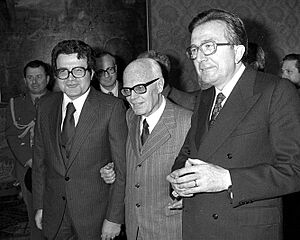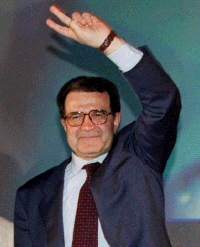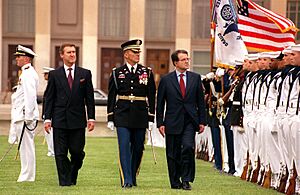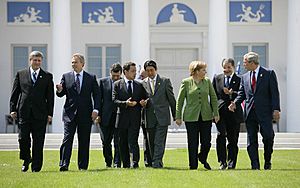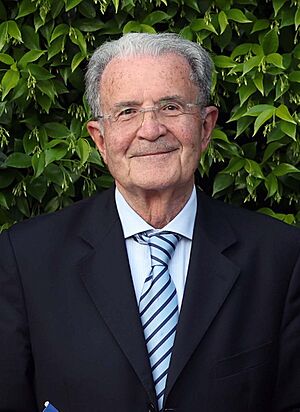Romano Prodi facts for kids
Quick facts for kids
Romano Prodi
|
|
|---|---|
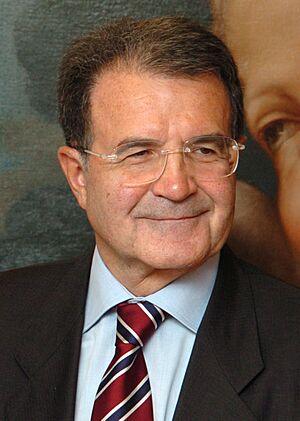
Prodi in 2004
|
|
| President of the European Commission | |
| In office 16 September 1999 – 21 November 2004 |
|
| Vice President | Neil Kinnock |
| Preceded by | Manuel Marín |
| Succeeded by | José Manuel Barroso |
| Prime Minister of Italy | |
| In office 17 May 2006 – 8 May 2008 |
|
| President | Giorgio Napolitano |
| Deputy |
|
| Preceded by | Silvio Berlusconi |
| Succeeded by | Silvio Berlusconi |
| In office 18 May 1996 – 21 October 1998 |
|
| President | Oscar Luigi Scalfaro |
| Deputy | Walter Veltroni |
| Preceded by | Lamberto Dini |
| Succeeded by | Massimo D'Alema |
| President of the Democratic Party | |
| In office 14 October 2007 – 16 April 2008 |
|
| Secretary | Walter Veltroni |
| Preceded by | Office Created |
| Succeeded by | Rosy Bindi |
| Minister of Industry, Commerce and Crafts | |
| In office 25 November 1978 – 21 March 1979 |
|
| Prime Minister | Giulio Andreotti |
| Preceded by | Carlo Donat-Cattin |
| Succeeded by | Franco Nicolazzi |
| Member of the Chamber of Deputies | |
| In office 28 April 2006 – 28 April 2008 |
|
| Constituency | Emilia-Romagna |
| In office 9 May 1996 – 16 September 1996 |
|
| Constituency | Bologna |
| Personal details | |
| Born |
Romano Antonio Prodi
9 August 1939 Scandiano, Italy |
| Political party | Christian Democracy (1963–1994) Italian People's Party (1994–1996) Independent (1996–1999, 2002–2007; since 2013) The Democrats (1999–2002) Democratic Party (2007–2013) |
| Other political affiliations |
The Olive Tree (1995–2007) The Union (2004–2007) |
| Spouse |
Flavia Franzoni
(m. 1969; |
| Children | 2 |
| Alma mater | |
| Signature | |
Romano Prodi, born on August 9, 1939, is an Italian politician. He held important roles in both Italy and Europe. He was the President of the European Commission from 1999 to 2004. He also served as Prime Minister of Italy twice, first from 1996 to 1998, and then again from 2006 to 2008.
People often call him Il Professore (which means "The Professor"). This nickname comes from his earlier career as a university professor. He is known for helping to create the Italian centre-left political group in Italy.
Contents
- Early Life and Family Background
- Academic Career and Studies
- Early Political Roles
- Business and Administrative Work
- First Time as Prime Minister (1996–1998)
- Leading the European Commission (1999–2004)
- Back to Italian Politics (2005–2006)
- Second Time as Prime Minister (2006–2008)
- After Being Prime Minister (2008–Present)
- Electoral History
- Honours and Awards
- See also
Early Life and Family Background
Romano Prodi was born in Scandiano, Italy, in 1939. He was the eighth of nine children in his family. His father, Mario Prodi, was an engineer. His mother, Enrichetta, was an elementary school teacher.
Many of his brothers also became university professors. These include Giovanni, Vittorio, Paolo, Franco, and Giorgio Prodi.
In 1969, Prodi married Flavia Franzoni. She was a student at the time and later became an economist and professor. They had two sons, Giorgio and Antonio. Flavia passed away in June 2023.
Academic Career and Studies
Prodi finished his high school education in Reggio Emilia. He then studied law at Milan's Università Cattolica del Sacro Cuore. He graduated in 1961. His main project was about how protectionism helped Italian industries grow.
After that, he continued his studies at the London School of Economics. Over the years, Prodi received nearly 20 honorary degrees. These came from universities in Italy, Europe, North America, Asia, and Africa.
Early Political Roles
Minister of Industry
On November 25, 1978, Prodi became the Minister of Industry, Commerce, and Crafts. He served in the government led by Giulio Andreotti. Even though he was a member of the Christian Democracy party, he was seen as a technical expert.
As minister, he introduced a law known as the Prodi law. This law helped manage large companies that were in financial trouble.
Business and Administrative Work
After leaving his government role in 1989, Prodi managed a consulting company. It was called Analisi e Studi Economici and was based in Bologna. He owned this company with his wife.
Leading IRI Again
In 1993, Prodi was considered for the role of Prime Minister of Italy. However, Carlo Azeglio Ciampi was chosen instead.
From 1993 to 1994, Prodi was again appointed President of the IRI. The IRI was a large state-owned company. During this time, he oversaw the sale of many public assets to private companies.
First Time as Prime Minister (1996–1998)
On May 25, 1994, Prodi resigned from his role at IRI. He then announced his plan to enter politics in August of that year.
Forming The Olive Tree Coalition
In February 1995, Prodi and his friend Arturo Parisi started a political group called The Olive Tree. Prodi wanted to create a strong centre-left alliance. This group would stand against the centre-right alliance led by Silvio Berlusconi.
Many parties joined The Olive Tree. These included the Democratic Party of the Left, the Italian People's Party, and the Federation of the Greens.
Winning the 1996 Election
In the 1996 election, Prodi's Olive Tree coalition won. This was a big moment because it was the first time a post-communist party was part of a winning government since World War II. The Olive Tree gained a majority in the Senate. They also had enough support in the Chamber of Deputies with help from the Communist Refoundation Party.
On May 17, 1996, President Oscar Luigi Scalfaro asked Prodi to form a new government. Prodi created a cabinet with 23 members. It included 16 ministers from the Democratic Party of the Left.
Key Policies and Challenges
Prodi's main goal was to improve Italy's economy. He wanted Italy to meet the strict rules of the European Monetary System. This would allow Italy to join the Euro currency. He achieved this goal in just over six months.
During his first time as Prime Minister, Prodi also dealt with the 1997 Albanian civil unrest. His government sent a multinational peacekeeping force, called Operation Alba, to Albania. This force helped the Albanian government bring back law and order after a rebellion.
Italy led this mission, which was the first Italian-led multinational mission since World War II. Eleven European countries helped provide aid to Albania. Prodi stated that the main problem for the country was internal safety for its citizens.
Government Resignation
Prodi's government ended in 1998. The Communist Refoundation Party stopped supporting his government. This led to a new government being formed, led by Massimo D'Alema.
Leading the European Commission (1999–2004)
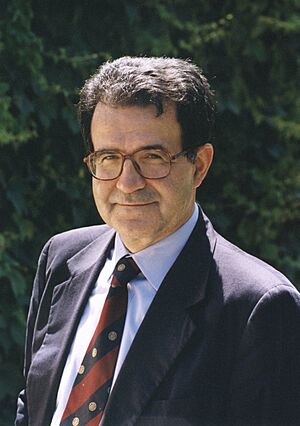
In September 1999, Prodi became the President of the European Commission. He was a strong supporter of European Integration. He received support from various political groups in the European Parliament.
His team, known as the Prodi Commission, started its work on September 13, 1999. This happened after a scandal led to the resignation of the previous commission. Prodi's commission had 20 members, called Commissioners. This number grew to 30 after the Enlargement of the European Union in 2004.
Impact of Treaties
During Prodi's time as president, a major change happened in 2002. Eleven EU countries stopped using their national money and started using the euro.
The Commission's power grew after the Amsterdam Treaty. This treaty was signed in 1997. It gave more power to the European Parliament in areas like immigration and foreign policy. Because of this increased power, some people called Prodi the first "Prime Minister of the European Union".
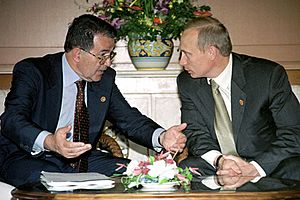

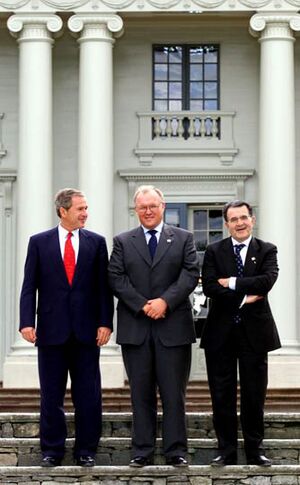
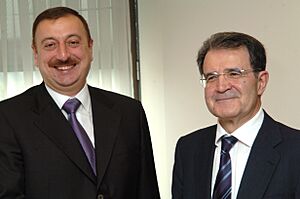
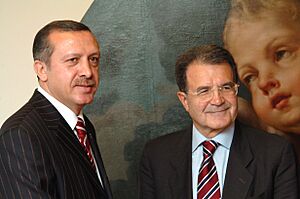
The Prodi Commission also saw the signing of the Treaty of Nice in 2001. This treaty changed the structure of the European Union. It helped prepare the EU for new countries to join.
EU Enlargement and End of Term
In 2004, the European Union grew significantly. Several new countries joined, many of them from the former Eastern Bloc. This was the largest expansion of the EU in terms of land area and number of states.
The countries that joined on May 1, 2004, were Cyprus, the Czech Republic, Estonia, Hungary, Latvia, Lithuania, Malta, Poland, Slovakia, and Slovenia.
Prodi's term as Commission President was supposed to end on October 31, 2004. However, it was extended until November 21, 2004, due to some disagreements in the European Parliament. After his time in Europe, Prodi returned to Italian politics.
Back to Italian Politics (2005–2006)
The Union Primary Election
Before his term as European Commission President ended, Prodi decided to return to Italian politics. He led a larger centre-left group called The Union.
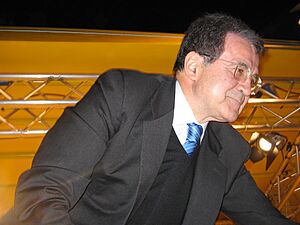
To become the official candidate for the 2006 general election, Prodi came up with a new idea. He proposed holding a primary election. This was the first time such an election was held in Europe. Prodi believed it would help connect the public more with Italian politics.
Initially, it seemed like Prodi would easily win the primary election. However, other candidates decided to run. These included Fausto Bertinotti, Clemente Mastella, Antonio Di Pietro, and Alfonso Pecoraro Scanio.
The primary election took place on October 16, 2005, across Italy. Many people thought that about one million voters would participate. However, over four million people voted in the primary election. This showed a strong interest from the public.
Second Time as Prime Minister (2006–2008)
The 2006 Italian General Election
After winning the primary election, Prodi led The Union coalition in the 2006 election. The Union was a diverse group of parties. It included both centrist and communist parties.
Prodi's coalition won the election by a very small number of votes. They had a majority of two seats in the Senate. On April 11, 2006, Prodi announced his victory.
The final results showed The Union winning more seats in the Chamber of Deputies. They also gained control of both chambers of parliament. On April 19, 2006, Italy's Supreme Court confirmed Prodi's victory.
Forming a New Government
Prodi's appointment as Prime Minister was slightly delayed. This was because the outgoing president, Carlo Azeglio Ciampi, was ending his term. After Giorgio Napolitano was elected as the new president, Prodi could form his government.
On May 17, 2006, Prodi and his second cabinet were sworn into office. His new cabinet included politicians from across his centre-left coalition. Romano Prodi gained support for his government in both the Senate and the Chamber of Deputies.
Prodi's coalition had a strong majority in the Chamber of Deputies. However, they had a very small majority in the Senate. The coalition included parties with different ideas, from communist to Catholic. This made it challenging to agree on policies in areas like economics and foreign affairs.
Foreign Policy Decisions
In foreign policy, Prodi's second government continued to be involved in Afghanistan. However, they withdrew Italian troops from Iraq on May 18, 2006. Prodi called the Iraq War a "grave mistake."
Foreign Minister Massimo D'Alema played a key role after the 2006 Lebanon War. Italy was the first country to offer troops to the UN for the UNIFIL force. Prodi also helped create a multinational peacekeeping force in Lebanon.
Challenges for the Coalition
Prodi's government faced difficulties in early 2007. Some ministers did not support funding for Italian troops in Afghanistan. There were also disagreements about expanding a US military base.
On February 21, 2007, Prodi resigned as Prime Minister. President Giorgio Napolitano asked him to stay in office. Prodi agreed, but only if he had the full support of all parties in his coalition.
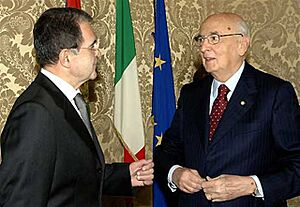
On February 28, the Senate voted to support Prodi's government. He also won a vote of confidence in the lower house on March 2.
On October 14, 2007, Prodi led the merger of two main centre-left parties. This created the Democratic Party. Prodi became the first President of this new party. He resigned from this role in April 2008.
2008 Government Crisis
In early 2008, Justice Minister Clemente Mastella resigned. His party, UDEUR, was important for Prodi's narrow majority in the Senate. Mastella's party then withdrew its support for the government.
This decision led Prodi to ask for a vote of confidence in both chambers of parliament. He won in the Chamber of Deputies but lost in the Senate on January 24. Because of this, he resigned as Prime Minister.
President Napolitano then called for new elections. Prodi stated that he would not seek to lead a new government. In the election that followed, Silvio Berlusconi's centre-right party won.
After Being Prime Minister (2008–Present)
On March 19, 2008, Romano Prodi said he was leaving Italian politics.
On September 12, 2008, the UN named Prodi as the head of a joint panel. This panel aimed to improve peacekeeping operations in Africa.
He also became a professor at Brown University in 2009. Since 2010, he has been the chair for Sino-European dialogue at the China Europe International Business School.
In October 2012, the UN Secretary-General Ban Ki-moon appointed Prodi as his Special Envoy for the Sahel region. He held this position until January 2014.
Prodi is also a member of the Club de Madrid. This is an international group of former democratic leaders. They work to strengthen democracy around the world.
2013 Presidential Candidate
In the 2013 presidential election, some members of the Democratic Party suggested Prodi for President of Italy. However, he did not receive enough votes.
On April 19, Prodi announced he was no longer running for president. This was after more than 100 centre-left voters did not vote for him. After this, Pier Luigi Bersani, the leader of the Democratic Party, resigned.
Electoral History
| Election | House | Constituency | Party | Votes | Result | |
|---|---|---|---|---|---|---|
| 1996 | Chamber of Deputies | Bologna–Mazzini | Ulivo | 55,830 | ||
| 2006 | Chamber of Deputies | Emilia-Romagna | Ulivo | – | ||
First-Past-The-Post Elections
| 1996 general election (C): Bologna — Mazzini | ||||
|---|---|---|---|---|
| Candidate | Party | Votes | % | |
| Romano Prodi | The Olive Tree | 55,830 | 60.8 | |
| Filippo Berselli | Pole for Freedoms | 35,972 | 39.2 | |
| Total | 91,802 | 100.0 | ||
Honours and Awards
 Albania: Received a copy of the Key of the City of Tirana (Albania).
Albania: Received a copy of the Key of the City of Tirana (Albania). France: Grand Cross of the Legion of Honour (2013).
France: Grand Cross of the Legion of Honour (2013). Italy: Knight of Grand Cross of the Order of Merit of the Italian Republic (1993).
Italy: Knight of Grand Cross of the Order of Merit of the Italian Republic (1993). Japan: Grand Cordon of the Order of the Rising Sun (2012).
Japan: Grand Cordon of the Order of the Rising Sun (2012). KSA: Grand Cordon of the Order of Abdulaziz Al Saud (2007).
KSA: Grand Cordon of the Order of Abdulaziz Al Saud (2007). Latvia: First Class of the Order of the Three Stars (2007).
Latvia: First Class of the Order of the Three Stars (2007). Poland: Knight Grand Cross of the Order of Merit of the Republic of Poland (1997).
Poland: Knight Grand Cross of the Order of Merit of the Republic of Poland (1997). Romania: Knight Grand Cross of the Order of the Star of Romania (2000).
Romania: Knight Grand Cross of the Order of the Star of Romania (2000). Slovakia: Grand Cordon of the Order of the White Double Cross (2022).
Slovakia: Grand Cordon of the Order of the White Double Cross (2022). Slovenia: First Class of the Order for Exceptional Merits (2005).
Slovenia: First Class of the Order for Exceptional Merits (2005). Spain: The Most Excellent Sir Grand Cross of the Royal Order of Isabella the Catholic (1998).
Spain: The Most Excellent Sir Grand Cross of the Royal Order of Isabella the Catholic (1998).
Academic Awards
- Laurea in Giurisprudenza (110 e lode) Università Cattolica Milano (1961)
- Madras University (India, 1998)
- Sofia University (Bulgaria, 1998)
- Universitat Politecnica de Barcelona (Spain, 1998)
- Brown University (United States, 1999)
- University of Michigan (United States, 1999)
- Bucharest Academy of Economic Studies (Romania, 2000)
- Catholic University of Leuven (Belgium, 2000)
- University of Malta (Malta, 2000)
- University of Modena and Reggio Emilia (Italy, 2000)
- University of Ottawa (Canada, 2000)
- St. Gallen University (Switzerland, 2000)
- Kyung Hee University, (South Korea, 2000)
- Pisa University (Italy, 2001)
- University of Tirana (Albania, 2001)
- Carleton University (Canada, 2001)
- Instituto de Empresa de Madrid (Spain, 2002)
- University of Oxford, (United Kingdom, 2002)
- Pavia University, (Italy, 2002)
- Skopje University, (North Macedonia, 2003)
- Tunis University, (Tunisia, 2003)
- University of Calabria (Italy, 2003)
- Torino University (Italy, 2004)
- Lublin University (Poland, 2004)
- Tongji University (P.R.China, 2006)
- Catholic University of Milan (Italy, 2007)
- Addis Abeba University (2007)
- University of Calcutta (2007)
- University of Freiburg (2008)
- MIRBIS University Moscow (2009)
- Chinese Academy of Governance (P.R.China, 2010)
- University of Nova Gorica (2010)
- Nankai University (P.R.China, 2010)
- University of Halle-Wittenberg (Germany, 2011)
See also
 In Spanish: Romano Prodi para niños
In Spanish: Romano Prodi para niños
- Enlargement of the European Union
- Lisbon Agenda


